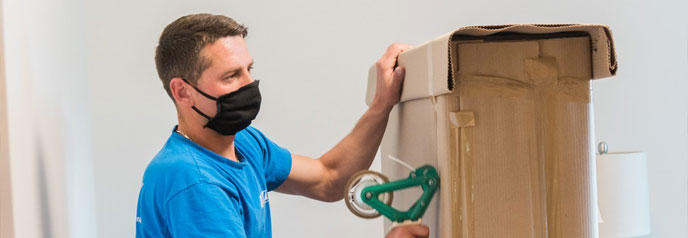Quality of Life Priorities
Housing

Army leaders are committed to improving housing and barracks conditions and earning back the trust of Soldiers and their Families. They are taking actions to provide quality housing to residents, changing behaviors and holding Army leadership and private housing landlords accountable. The Army hired more housing inspectors who regularly inspect for safety hazards, identify problems and require landlords to promptly address them.
Accomplishments
- The Army released the results of the 2020 OSD Tenant Satisfaction Survey on April 16, 2021. Participation rates increased by 4.4% for privatized Housing and 3.3% for Army-Owned/Leased Housing. The results of these surveys will be used by installation leadership, in conjunction with government housing managers and private company property managers to further refine action plans to address deficiencies and prioritize resources. View the Summary of Tenant Satisfaction Results for Army Family Housing (Owned and Leased) and the Summary of Tenant Satisfaction Results for the Army’s Residential Communities Initiative (RCI).
- The Army completed 100% barracks inspections and home visits in 2019. 100% “change of occupancy” inspections and assurance checks on life, health and safety work orders are underway. Information about Army family housing and related health issues is available through the Housing Environmental Health Response Registry.
- In the past two years, the Army has invested approximately $2.48 billion in barracks construction and renovations.
- The Army hired 114 additional government personnel to oversee privatized housing.
- The Army published a new incentive Performance Management Plan and Fee Structure to improve Residential Communities Initiative (RCI) company accountability.
- The Army established 24-7 hotlines, launched phone apps to track work orders and holds quarterly town hall meetings at every installation. For more housing information at each installation, visit the Army Housing Online User Services website.
Way Ahead
- The Army is planning further investments to improve single Soldier housing and barracks construction.
- RCI companies committed to investing $1.1 billion in privatized housing from fiscal years 2020-2024 with $800 million being executed in fiscal years 2020-2021.
- The Army is conducting regular home inspections for safety hazards to identify mold, asbestos and peeling lead paint, among other potential hazards.
- The Military Housing Privatization Initiative (MHPI) Tenant Bill of Rights was signed on May 1, 2020 by the Secretary of Defense and endorsed by each military branch’s civilian appointed Secretary. The document identifies rights and procedures that outline the responsibilities of the military services, the privatized housing partner and the housing resident. It includes a number of initiatives designed to support military members and their families, including the right to reside in a housing unit and a community that meets applicable health and environmental standards, the right to a written lease with clearly defined rental terms, and the right to have sufficient time and opportunity to prepare and be present for move-in and move-out inspections.
Housing Survey Results
- NEW: Summary of Tenant Satisfaction Results for Headquarters Department of the Army Family Housing (Owned and Leased) - March 2021
- NEW: Summary of Tenant Satisfaction Results for the Army’s Residential Communities Initiative (RCI) - February 2021
- Summary for the Headquarters Department of the Army FH Survey (Owned and Leased) Housing Fall 2019
- Summary of the Headquarters Department of the Army Residential Communities Initiative (RCI) 2019 Fall Resident Survey (On-Base)
- 2019 Executive Summary of the Headquarters of the Department of the Army FH Resident Survey (Owned and Leased) Housing
- 2019 Summary of the Headquarters Department of the Army Residential Communities Initiative Resident Survey (On-Base)
Health Care

The health and safety of the Army Family is our constant focus. Army Medicine will ensure Soldiers, Civilians and Families enjoy the professional opportunities and quality of life deserved.
Accomplishments
- Defense Health Agency (DHA) assumed authority, direction and control (ADC) of all US-based Medical Treatment Facilities (MTF) in October 2019. Overseas, the goal is to complete transitions by October 2021. The Army directly supports the Defense Health Agency by maintaining control of Army military treatment facilities Army Medicine provides the Army the agility and flexibility necessary to respond to the COVID-19 pandemic by offering guidance and oversight as DHA continues to establish its capabilities and organizational structure.
- The Warrior Care and Transition Program has been restructured as the Army Recovery Care Program (ARCP) to ensure the program safeguards the humanity, dignity, and respect of wounded, ill, and injured Soldiers.
- The Army Medical Readiness Assistance Program (AMRAP) assists Soldiers and Families with resolving medical and health-related issues. An Ombudsman helps beneficiaries navigate the health care network and access the care they need using a 24-7 hotline. The Surgeon General approved the AMRAP COVID-19 Information Hotline on March 13, 2020. As of July 13, 2020, the hotline processed 2,525 calls from SMs, Families and others with questions related to testing, travel, admin concerns, Nurse Advice Line, general and return to work (RTW) guidance.
- The Army implemented medical policies to address health concerns related to environmental hazards. The Army regularly informs housing residents about potential health impacts of environmental hazards and strategies for prevention. The Housing Environmental Health Response Registry gives residents information about environmental health hazards, assistance seeking health care and access to public health professionals.
Way Ahead
- Expanded virtual health for primary, specialty and preventive care. Encounters have increased from 15.8% in January to 29.2% of total visits in June 2020. With the addition of a clinical healthcare platform, we anticipate more providers will use virtual modalities to connect with their patients.
- During the pandemic, people may face extended periods of self-isolation, spouse layoffs, school cancellations, or other stress. Army Medicine is working in coordination with DHA to develop MTF guidance on increasing utilization of virtual BH across the enterprise to adapt to COVID-19 risks.
- Health of the Army Family summary report, a collection of findings from data and literature reviews on Army Families, will focus on information pertinent to Army Families as they go through the military life cycle. The AUSA Family Forum has been repurposed due to AUSA being a virtual event. The Family Forums will occur through monthly podcasts and webinars. Army Public Health Center (APHC) will discuss the Health of the Army Family summary report at one of the podcasts (tentatively scheduled for September 2020). The Health of the Army Family summary report is expected to be released in December 2020.
Resources
- TriCare
- Military One Source
- Transition Health Care
- Warrior Care and Transition
- TriCare Reserve Select
- Reserve Component Members Health Care
- Reserve Component Health Care Benefits Brochure
- Sexual Harassment Assault Response and Prevention
- Suicide Prevention
- Veterinarian Services
- STAND-TO! Transfer of Army Medical Treatment Facilities
Child Care

The Army provides quality, affordable child care programs and is investing in initiatives to increase child care access.
[PDF – 24KB]
Army CYSS Space Available Patrons
Accomplishments
- 100% of Army Child and Youth programs are certified to operate by the Department of Defense. The certification is granted after the successful completion of four unannounced inspections.
- 98% of Army Child Development Centers and 100% of School Age Centers are nationally accredited.
- From January 2018 to February 2020, the Army’s on-board child care staffing increased from 79% to 86%, increasing available child care spaces.
- The Army continues efforts to attract and retain high quality child care providers through improved recruiting, marketing and increased incentives. Military spouses make up approximately 30% of the child care workforce.
- The Army expanded the number of Family Child Care (FCC) homes from 130 to 181. By the end of fiscal year 2022, the Army expects to have approximately 350 FCC providers to reduce child care wait lists and to provide an additional spouse employment opportunity.
- School Liaisons are available at each installation to assist Families with school transitions.
- The Army is participating in a DoD pilot, MCCYNplus, to increase the number of community-based providers eligible to participate in the Services’ Fee Assistance Programs. The Army serves more than 10,000 Families each year in its Fee Assistance Program.
Way Ahead
- The Army developed a Child Development Center facility modernization and recapitalization plan that considered the need and location for CDC projects over the next 5 years.
- The Army is addressing ways to meet the demand for hourly care by expanding hourly care options in FCC homes working with partners like the Armed Forces YMCA for additional hourly care capacity.
- The Army created the Civilian Employee Assistance Tool (CEAT), which expedites the transfer of CYS program assistants who are Army spouses relocating from another installation. CEAT reduces transfer time by two weeks by eliminating duplicative pre-employment checks and streamlining the notification and hiring process to ensure that Army spouses can seamlessly continue their careers at their new location. CEAT is now available for all non-nppropriated employees in NF03 and below.
- To improve the education of military children, the Army will conduct virtual education pilots at two locations to improve access to advanced placement classes, foreign language and trade skills opportunities.
Spouse Employment

The Army is improving career and employment opportunities for military spouses through new programs and existing partnerships. The Army is implementing a holistic approach to helping military spouses find jobs, build careers and improve their quality of life.
[PDF – 111KB]
Reimbursement for State Licensure and Certification Costs for Spouses arising from a PCS
Accomplishments
- Learn about the many education and job assistance resources, training and opportunities available to military spouses.
- In December 2018, the Army updated its home-based business policy to streamline and standardize the application process and encourage growth in portable home-based businesses.
- The Army is exploring direct hire authority and hiring preferences to support transferring spouses. In January 2020, the Secretary of the Army authorized up to $1000 reimbursement for professional license/certification in a new state after permanent change of station, and the Army continues to publicize this to spouses. The Army also issued a directive simplifying the application process for reimbursement.
- The Army is a key participant in the Military Spouse Employment Partnership, which seeks to connect military spouses with over 340 employers in the U.S. Those who have committed to recruit, hire, promote and retain military spouses in portable careers to accommodate the challenges they face with frequent relocation associated with military life.
- The Army expanded the Child and Youth Service Employee Assignment Tool (CEAT) and renamed it the Civilian Employee Assignment Tool. CEAT allows eligible Nonappropriated Fund employees (NAF-03 and below) to transfer, without a break in service, from one Army Installation to another when the same position is available at the gaining garrison. Learn more about the expansion of the Army Nonappropriated Fund Child and Youth Service Employee Assignment Tool.
- The Spouse Eduction and Career Opportunities (SECO) program has two new services to strengthen military spouses resumes. Learn more about resume reviews and the job search navigator.
- SECO updated their website to reflect telework/remote work opportunities and job offerings from their partners. Learn more about telework career paths and considerations.
Way Ahead
- The Army continues to work, through the Defense State Liaison Office, with state leaders to improve license reciprocity, and simplified professional license/certification reimbursement.
- The Army is strengthening the Army Community Service Employment Readiness Program and adding certified career counselors to the Program.
- The Army continues to work with DoD’s Spouse Education and Career Opportunities Program that focuses on reducing the unemployment rate and wage gap between military spouses and their civilian counterparts.
- Army continues to collaborate with DoD on virtual hiring events.
PCS Moves

The Army continues to implement policies and initiatives to improve and streamline Permanent Change of Station (PCS) relocations for Soldiers and their Families. These are intended to help provide a smooth transition to their new homes. The DoD's official Customer Moving Portal is https://move.mil.
Assistance Call Centers
- Army Travelers Assistance Center: 1-800-582-5552, Ext. 5
- U.S. Transportation Command 24/7 Customer Support: 1-833-645-6683 or 1-833-MIL MOVE
- The Army Center for Personnel Claim Support (formerly Military Claims Office): 1-502-626-3000, Email: usarmy.knox.hqda-otjag.mbx.cpcs@mail.mil
- Army Joint Personal Property Shipping Office – Mid-Atlantic, Fort Belvoir, Virginia (8 a.m. to 7 p.m. EST): 1-800-762-7186, Comm. 1-703-806-4900, DSN 656-4900
Accomplishments
- The Army launched a new mobile application called “Army PCS Move” that is now available in the Apple App Store and the Google Play Store.
- The Army sponsored a revision to the Joint Travel Regulations which increased the monetary payment to Soldiers who choose to move their household goods under the personally procured move (PPM) program. Effective for all moves initiated on or after May 26, 2020 through Dec. 31, 2020, Soldiers using the PPM program can receive a payment equal to 100% of the estimated cost the government would pay a moving company to move their items.
- PPMs provide Soldiers and Civilians more flexibility to schedule their move and is an option to avoid contact with outside agencies.
- The Army is authorizing payment of dislocation allowance before families depart, which will assist with relocation expenses.
- As of July 20, the Army hired 365 of 423 household goods inspectors needed to meet the 100% quality assurance inspection target. This includes 25 spouses and four Family members that have been hired.
- The overall goal is to conduct 100% inspection of household goods moves with at least 75% of the moves having in-person inspection.
- The claim notification deadline has been increased from 75 to 180 days after delivery to identify any loss or damage, with the choice to repair or receive full repair costs.
- The Army Relocation Advisory Committee (ARAC), an intra-Army committee, was established to identify and resolve PCS issues. The committee consists of Army stakeholders and includes Active, Reserve, and National Guard spouses.
- Moving companies are being held accountable for their services. The Army posted moving company customer satisfaction survey scores online for Soldier review and transparency on the Defense Personal Property System (DPS) customer page.
- The Army has updated policies and processes to ensure Soldiers have PCS orders in-hand no later than 120 days from departure.
- There is an eight question customer satisfaction survey (CSS) which is the primary source of data used to evaluate each moving company’s performance. Soldiers and Civilians can access the CSS in the Defense Personal Property System (DPS) for each HHG shipment delivered to their residence, or can complete the survey by phone through the U.S. Transportation Command Help Desk at 1-800-462-2176 (select option 2, then option 1). Survey completion is very important as it contributes to an average assessment of the moving company performance over a specified period. The moving companies are ranked by their averaged scores and the higher the score the more business the moving company receives; conversely, lower averages mean less business for the moving company. Those companies who fail to meet the minimum acceptable average score are removed from doing business with the government.
- The Army has increased the use of containerized shipments in CONUS to reduce the loss and/or damage to the personal property. To qualify the shipment must be less than 10,000 pounds, moving at least 800 miles, require temporary storage, no direct deliveries, and no large bulky items that will not fit in the container.
Quality of Life Priorities
Housing
Army leaders are committed to improving housing and barracks conditions and earning back the trust of Soldiers and their Families.
Health Care
The health and safety of the Army Family is our constant focus.
Child Care
The Army provides quality, affordable child care programs and is investing in initiatives to increase child care access.
Spouse Employment
The Army is improving career and employment opportunities for military spouses through new programs and existing partnerships.
PCS Moves
The Army continues to implement policies and initiatives to improve and streamline Permanent Change of Station (PCS) relocations for Soldiers and their Families.
I, like each and every one of you, am committed to taking care of our people, and maintaining our readiness while modernizing our capabilities.
– Acting Secretary of the Army John E. Whitley
Policy Changes
- Army Directive 2020–01 Reimbursement for State Licensure and Certification Costs From a Permanent Change of Station
- Army Directive 2019–29 Home Based Businesses
- Army Directive 2019–05 Army Military Personnel Parental Leave Program
- Army Directive 2019–10 Army CYSS Space Available Patrons
- Army Directive 2019–17 Changes to Family Readiness Group Program
NEWS
VIDEOS
Army Resources
- STAND-TO! Army Quality of Life
- Army.mil: Gold Star Survivors
- STAND-TO! Quality of Life Task Force
- STAND-TO! Exceptional Family Member Program
- STAND-TO! Soldier and Family Readiness Groups
- U.S. Army MWR
- Army Reserve Family Programs
- Military OneSource
- National Guard Family Program
- Army Community Service (ACS)
- Comprehensive Soldier and Family Fitness
- DOD Warrior Care: Military Caregiver Support
- Spouse Licensure Guide
